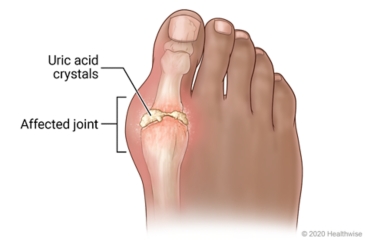Overview

Gout is a form of arthritis caused by a buildup of uric acid crystals in a joint. It causes sudden attacks of pain, swelling, redness, and stiffness, usually in one joint, especially the big toe.
Gout usually comes on without a cause. But it can be brought on by drinking alcohol (especially beer), eating or drinking things made with high-fructose corn syrup, or eating seafood or red meat. Taking certain medicines, such as diuretics, can also trigger an attack of gout.
Taking your medicines as prescribed and following up with your doctor regularly can help you avoid gout attacks in the future. Making lifestyle changes and avoiding triggers may also help.
Follow-up care is a key part of your treatment and safety. Be sure to make and go to all appointments, and contact your doctor if you are having problems. It's also a good idea to know your test results and keep a list of the medicines you take.
How can you care for yourself at home?
- If the joint is swollen, put ice or a cold pack on the area for 10 to 20 minutes at a time. Put a thin cloth between the ice and your skin.
- Prop up the sore limb on a pillow when you ice it or anytime you sit or lie down during the next 3 days or until your symptoms improve. Try to keep it above the level of your heart. This can help reduce swelling.
- Rest sore joints. Avoid activities that put weight or strain on the joints for a few days. Take short rest breaks from your regular activities during the day.
- Take your medicines exactly as prescribed. Call your doctor if you think you are having a problem with your medicine.
- Be safe with medicines. Read and follow all instructions on the label.
- If you are not taking a prescription pain medicine, ask your doctor if you can take an over-the-counter medicine.
- If the doctor gave you a prescription medicine for pain, take it as prescribed.
- Store your prescription pain medicines where no one else can get to them. When you are done using them, dispose of them quickly and safely. Your local pharmacy or hospital may have a drop-off site.
- Eat less seafood and red meat.
- Avoid foods or drinks that are made with high-fructose corn syrup.
- Check with your doctor before drinking alcohol.
- If you are at a higher weight, losing weight may help reduce attacks of gout. But do not go on a diet that causes rapid weight loss. Losing a lot of weight in a short amount of time can cause a gout attack.
When should you call for help?
Contact your doctor now or seek immediate medical care if:
- You have a fever.
- The joint is so painful you cannot use it.
- You have sudden, unexplained swelling, redness, warmth, or severe pain in one or more joints.
Watch closely for changes in your health, and be sure to contact your doctor if:
- You have joint pain.
- Your symptoms get worse or are not improving after 2 or 3 days.
Where can you learn more?
Go to http://www.healthwise.net/patientEd
Enter E531 in the search box to learn more about "Gout: Care Instructions".
Current as of: September 25, 2025
Author: Ignite Healthwise, LLC Staff
Clinical Review Board
All Ignite Healthwise, LLC education is reviewed by a team that includes physicians, nurses, advanced practitioners, registered dieticians, and other healthcare professionals.

